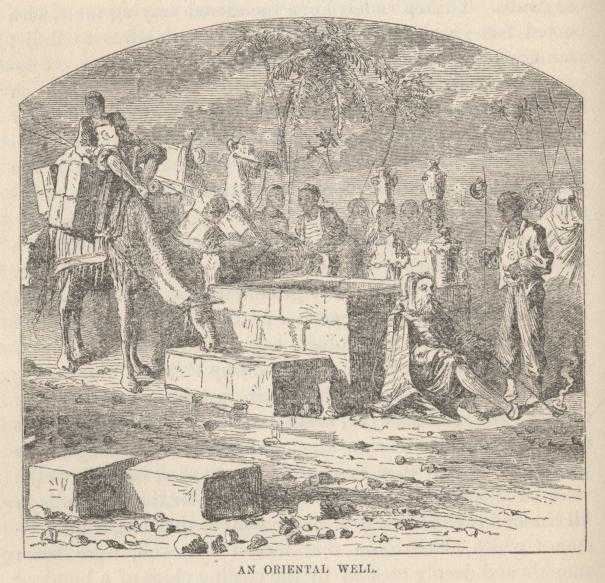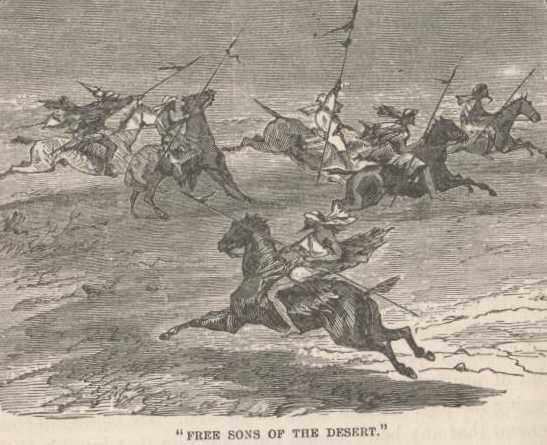We descended to the Plain again, and halted a moment at a well—of Abraham’s time, no doubt. It was in a desert place. It was walled three feet above ground with squared and heavy blocks of stone, after the manner of Bible pictures. Around it some camels stood, and others knelt. There was a group of sober little donkeys with naked, dusky children clambering about them, or sitting astride their rumps, or pulling their tails. Tawny, black-eyed, barefooted maids, arrayed in rags and adorned with brazen armlets and pinchbeck ear-rings, were poising water-jars upon their heads, or drawing water from the well. A flock of sheep stood by, waiting for the shepherds to fill the hollowed stones with water, so that they might drink—stones which, like those that walled the well, were worn smooth and deeply creased by the chafing chins of a hundred generations of thirsty animals. Picturesque Arabs sat upon the ground, in groups, and solemnly smoked their long-stemmed chibouks. Other Arabs were filling black hog-skins with water—skins which, well filled, and distended with water till the short legs projected painfully out of the proper line, looked like the corpses of hogs bloated by drowning. Here was a grand Oriental picture which I had worshiped a thousand times in soft, rich steel engravings!

But in the engraving there was no desolation; no dirt; no rags; no fleas; no ugly features; no sore eyes; no feasting flies; no besotted ignorance in the countenances; no raw places on the donkeys’ backs; no disagreeable jabbering in unknown tongues; no stench of camels; no suggestion that a couple of tons of powder placed under the party and touched off would heighten the effect and give to the scene a genuine interest and a charm which it would always be pleasant to recall, even though a man lived a thousand years.
Oriental scenes look best in steel engravings. I cannot be imposed upon any more by that picture of the Queen of Sheba visiting Solomon. I shall say to myself, You look fine, Madam but your feet are not clean and you smell like a camel.
Presently a wild Arab in charge of a camel train recognized an old friend in Ferguson, and they ran and fell upon each other’s necks and kissed each other’s grimy, bearded faces upon both cheeks. It explained instantly a something which had always seemed to me only a farfetched Oriental figure of speech. I refer to the circumstance of Christ’s rebuking a Pharisee, or some such character, and reminding him that from him he had received no “kiss of welcome."
It did not seem reasonable to me that men should kiss each other, but I am aware, now, that they did. There was reason in it, too. The custom was natural and proper; because people must kiss, and a man would not be likely to kiss one of the women of this country of his own free will and accord. One must travel, to learn. Every day, now, old Scriptural phrases that never possessed any significance for me before, take to themselves a meaning.
We journeyed around the base of the mountain—“Little Hermon,”—past the old Crusaders’ castle of El Fuleh, and arrived at Shunem. This was another Magdala, to a fraction, frescoes and all. Here, tradition says, the prophet Samuel was born, and here the Shunamite woman built a little house upon the city wall for the accommodation of the prophet Elisha. Elisha asked her what she expected in return. It was a perfectly natural question, for these people are and were in the habit of proffering favors and services and then expecting and begging for pay. Elisha knew them well. He could not comprehend that any body should build for him that humble little chamber for the mere sake of old friendship, and with no selfish motive whatever. It used to seem a very impolite, not to say a rude, question, for Elisha to ask the woman, but it does not seem so to me now. The woman said she expected nothing. Then for her goodness and her unselfishness, he rejoiced her heart with the news that she should bear a son. It was a high reward—but she would not have thanked him for a daughter—daughters have always been unpopular here. The son was born, grew, waxed strong, died. Elisha restored him to life in Shunem.
We found here a grove of lemon trees—cool, shady, hung with fruit. One is apt to overestimate beauty when it is rare, but to me this grove seemed very beautiful. It was beautiful. I do not overestimate it. I must always remember Shunem gratefully, as a place which gave to us this leafy shelter after our long, hot ride. We lunched, rested, chatted, smoked our pipes an hour, and then mounted and moved on.

As we trotted across the Plain of Jezreel, we met half a dozen Digger Indians (Bedouins) with very long spears in their hands, cavorting around on old crowbait horses, and spearing imaginary enemies; whooping, and fluttering their rags in the wind, and carrying on in every respect like a pack of hopeless lunatics. At last, here were the “wild, free sons of the desert, speeding over the plain like the wind, on their beautiful Arabian mares” we had read so much about and longed so much to see! Here were the “picturesque costumes!” This was the “gallant spectacle!” Tatterdemalion vagrants—cheap braggadocio—“Arabian mares” spined and necked like the ichthyosaurus in the museum, and humped and cornered like a dromedary! To glance at the genuine son of the desert is to take the romance out of him forever—to behold his steed is to long in charity to strip his harness off and let him fall to pieces.
Presently we came to a ruinous old town on a hill, the same being the ancient Jezreel.